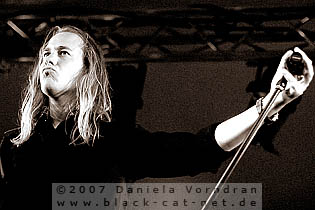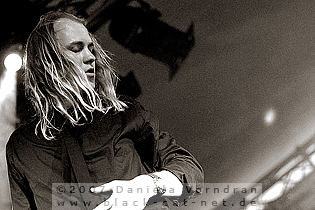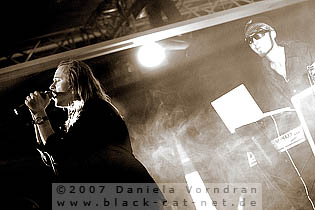 Interview with:
Interview with:Jan Dewulf - Diskonnekted
Jan Dewulf aka DISKONNEKTED is about to release his new album ‘Old School Policies’ in which he deals with religious fanaticism and conservative propaganda politicians. Jan justified himself to us about the new album and the role of religion in politics.
Jan Dewulf (D): Yes, I am. While making the album I had some kind of love/hate relationship with the music, because I had to hear all sounds over and over again while finishing the details. It can be very frustrating. But once the album was ready I felt very comfortable with the result. At that point however, the rest of the world can’t share my enthusiasm, as they have to wait until the album is released. And while waiting for the release date, I had plenty of time to get nervous. J
RoD: How have the reactions on the album been so far?
D: While I am still waiting for the first ‘real’ reviews on the album, already quite some good reactions slipped in from fans who heard some snippets on myspace for example. And I noticed DJ’s play the stuff on parties here in Belgium. So I guess it’s going well.
RoD: I noticed the overall mood of the album being very dark and angry. A direct result of the work on the ‘Frozen EP’ with Dirk Ivens or contingent on the topic of religious fanaticism you deal with on the album?
D: It was indeed the intention to sound a bit harder and harsher than on ‘Neon Night’. The ‘Frozen EP’ was a first step in that direction. And of course, as I deal with my disgust towards religious fanaticism and propaganda politics on this album, the dark sounds were developed rather spontaneously.
RoD: Why do you think religious organisations get involved into politics more and more during the last years?
D: I don’t know, but the enlightenment seems further away then before. Even young people nowadays seem to embrace old conservative ideas, while their parents were shouting for freedom in the 60s. Why this changeover? I guess the world is getting smaller, what makes different cultures conflict with each other more than before. Some people are scared by these other cultures and tend to go back to older ideas which in a way can define their lost identity again. I guess this is how religion slips into politics. Can you imagine that more than 50 percent of the American people would refuse to vote for a president if they knew that he is an atheist? That’s alarming, as I don’t think God fits the political agenda.
RoD: There was and I guess still is that discussion Darwin against Creationism. How come people rather believe in a higher entity creating the world and all living beings than already confirmed facts?
D: Science today has cleared up a lot of things, and has answered a bunch of questions that remained dark for us during centuries. People however choose to create their own answers on things, intermixed with their own ideological, philosophical and religious ideas. This of course leads to a somewhat blurred state of mind. It’s for example very frightening to see conservative politicians trying to keep Darwin out of the schoolbooks so they can protect their religious believes. So it seems quite a few people choose to have a blurry mind, instead of having it cleared up by correct information that is available for everyone (at least it should be). It is sometimes scary to see how people tend to choose dark and obscure ideas instead of clear and simple facts. But as Darwin put it: “Ignorance more frequently begets confidence than does knowledge: it is those who know little, and not those who know much, who so positively assert that this or that problem will never be solved by science.”
RoD: The first song on the new album is ‘Pray, Vote, Donate, Buy’. These words are repeated over and over again, during the course of the song. It has something hypnotic to it. Like someone’s trying to brainwash another person to make him/her a loyal fellow you, but don’t want to brainwash the listeners do you?
D: Okay thanks; I am happy you describe that song this way, as it was indeed my intention to create some kind of propagandistic and apocalyptic soundtrack for a totalitarian regime. Maybe I can send it to the religious freaks in America. They could use it for their ideological brainwash sessions. J
RoD: I have to admit that I was a little bit irritated at first, when I listened to ‘Anger’ for the first time, but it’s a pretty unique mixture and I never heard something like it before. Where did the idea to the collaboration with SMP come from and how did you come into contact?
D: I am totally aware of the fact that it is a “love it” or “hate it” track. I already received a lot of different reactions on the track. And I think that makes it really interesting. I can imagine in this scene a lot of people simply hate hip hop. Personally, I have always liked some hip hop now and then. While I hate the soft R’n’B-stuff, I always liked the heavy hip hop with attitude and testicles: House of Pain, Consolidated, or even some gangsta stuff. As industrial is also a genre that can be quite aggressive, the combination seems obvious, although it’s only seldom done. I knew the stuff from SMP and really enjoyed it. So I asked him to rap me “some lines”. He came up with an amazing vocal line that allowed me to create something really explosive. I am truly proud of the result. I recently fixed a remix for SMP, and again I really enjoyed doing an intermix of hip hop and industrial, so who knows I am going to do more of this shit in the future.


RoD: Let’s get to a more technical issue I’m always interested in. I heard from many musicians that they completely switch over to software when producing new music. Do you also prefer software or do you rather prefer the “Old-fashioned” way of using hardware synths?
D: I use both, although I definitely use software way more then before. It’s quick and easy. And it sounds great. So why would I stick to some old machines if the new software creates the same sounds. Of course some things can’t be done by digital ones and zeroes. That’s why I still use some hardware stuff, especially the analogue synths. But then again, with digital tools you can really invent new sounds that wouldn’t be possible with an old set up. So I am sure a combination of hard and soft is the ideal studio set up.
RoD: Electronic music provides so many possibilities to create new sounds. To manipulate, twist and layer them to get a whole new sound in the end. Why is it that many artists just rely on preset sounds?
D: Electronic music provides us endless possibilities indeed, so it’s really shameful that a lot of bands just use the same sounds and structures over again to stick to the safe formula. But then again I don’t understand the public either. It seems they can’t get enough of this crap anyway, so who’s to blame? Electronic music can be really adventurous, but the more adventurous you get, the more obscure your projects becomes. The challenge for artists in the electronic genre should be to create good tracks that can be both catchy and interesting sound wise.
RoD: For many people music has changed into a mere consumption product. Just download it and don’t bother with the consequences. Is it a direct consequence of the behaviour of the industry of flooding the market with trivial music, no one even remembers a year later?
D: I think the problem is rather complex. Sure, the market is flooded with trivial stuff. It’s easier to make music and to sound “good” then it was before. Virtually anyone has a band or project nowadays, and is featured online. And it is as free and cheap as any other music. I was raised with the concept of saving money so I could buy records, but nowadays young people are simply raised another way: they like a song and search it on the web. So there are quite some challenges for the industry. As the market is flooded with stuff, you somehow have to promote your music in a way that people understand it’s worth checking out. And then you have to persuade them to buy it, instead of stealing it. So maybe the industry should really try to reward music lovers who actually buy music. I don’t think it’s a “stealing against buying” thing as some people tend to understand the problem. I think it’s a “music lover against ignorant people” thing. So the challenge is to re-educate young music lovers so they can understand the fact that caring for music also means buying it.
RoD: Speaking of that: can you make a living out of your music or are you working on it besides your regular day job in your spare time?
D: I can’t make a living out of it. Let’s hope the new album will hit the charts! J
RoD: A last question: Are there plans for a tour promoting the new album?
D: I’d love to hit the road, really. Unfortunately, I am still looking for a solid contact with a booking agency that could arrange things for us. It’s very difficult to arrange gigs yourself. But we’re ready though, so I’d love to visit Germany and meet every one of you at a gig soon!
RoD: Thanks for the Interview
Thank you!
Jan
{jos_sb_discuss:21}






Comments powered by CComment